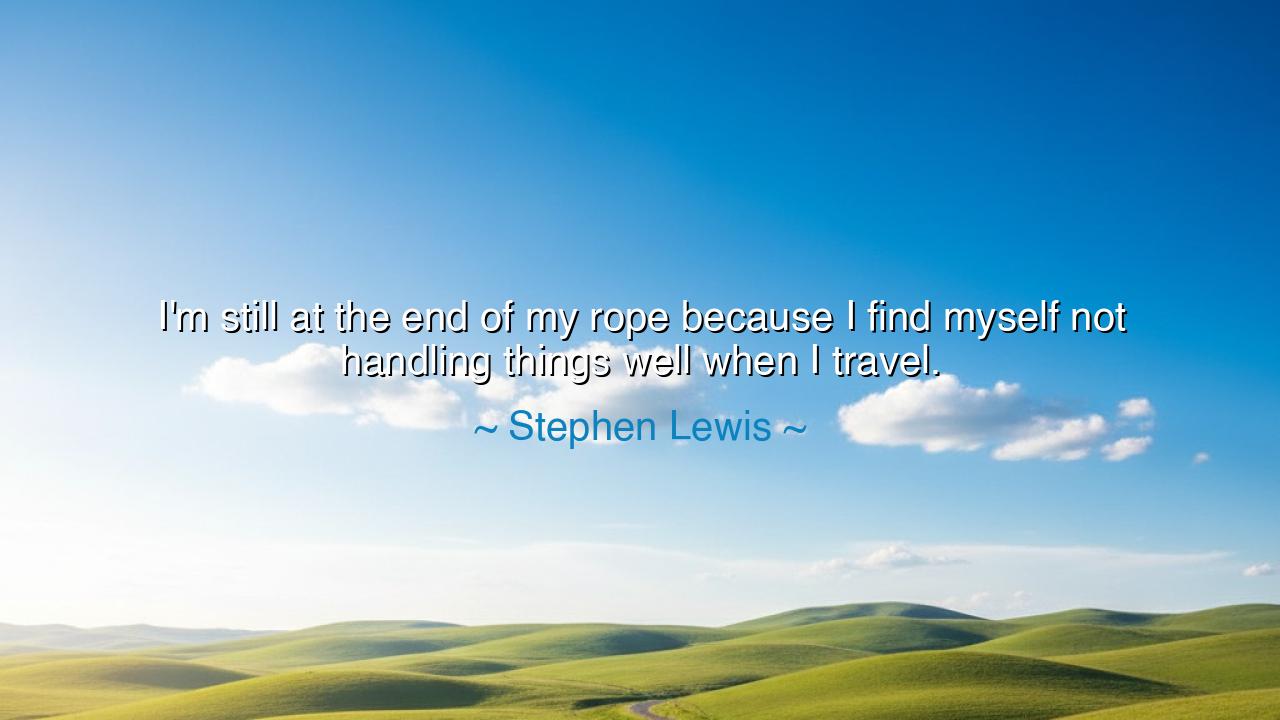
I'm still at the end of my rope because I find myself not
I'm still at the end of my rope because I find myself not handling things well when I travel.






In the words of Stephen Lewis, a man who bore the weight of diplomacy and service, we hear not triumph but a cry of weariness: “I’m still at the end of my rope because I find myself not handling things well when I travel.” These words, humble and vulnerable, remind us that even those who stand in public light are not made of unbreakable stone. They too grow weary, they too falter when burdened by endless movement, and they too confess the limits of their strength.
The phrase end of my rope is ancient in spirit, if not in literal origin. It speaks of reaching the boundary of endurance, when the hands that once held firm now tremble and slip. The ancients knew this well: even the strongest warrior, after countless battles, must admit exhaustion. To confess it is not weakness but truth, and truth is the foundation upon which healing can be built. Lewis, by admitting his limits, shows more courage than if he had boasted of unshakable resolve.
The mention of travel carries a double edge. For many, travel is freedom, adventure, and discovery; but for one already weary, it is burden, dislocation, and disarray. To live always on the road is to lose the anchor of home, the comfort of stillness, the rhythm of familiar walls. History reminds us of this truth: even Alexander the Great, though conqueror of nations, longed at times for rest, for the embrace of hearth and the peace of his homeland. Endless travel may enlarge horizons, but it also stretches the spirit thin.
To not be handling things well is an admission that the demands of life sometimes exceed the strength of the soul. The stoics of old urged men to master their passions, to remain unmoved in storm or fire. Yet even Marcus Aurelius, emperor and philosopher, confessed in his Meditations that he often struggled with impatience, anger, and despair. Lewis’s confession belongs to this lineage of honesty: the recognition that even the wise and the dedicated stumble beneath the load they carry.
The story of Florence Nightingale bears this out. Known as the “Lady with the Lamp,” she traveled to war-torn lands to tend the wounded. But in her letters, she revealed the toll: exhaustion, loneliness, and despair often shadowed her noble work. Like Lewis, she found that travel and service, though heroic in the eyes of others, could grind the spirit to its limits. Yet her honesty did not diminish her greatness—it revealed her humanity, and through her humanity, she became even greater.
From Lewis’s words arises a profound lesson: it is no shame to admit fatigue, nor to confess the struggle of endurance. Too often, we cloak ourselves in masks of strength, fearing that weakness will diminish us. But the ancients remind us that truth is greater than pride, and honesty is the first step toward restoration. To admit that one is at the end of the rope is not to let go—it is to ask for a new knot, a new handhold, a moment of rest to regain the climb.
So I say to you: when you feel at the end of your rope, do not despair. Speak your truth, as Lewis did. Seek rest when you travel too far, ask for help when the burdens grow heavy, and honor your limits as much as your strengths. For life is not a race without pause, nor a journey without weariness. The noble soul is not the one who never falters, but the one who admits when he falters, and finds the courage to rise again.






AAdministratorAdministrator
Welcome, honored guests. Please leave a comment, we will respond soon